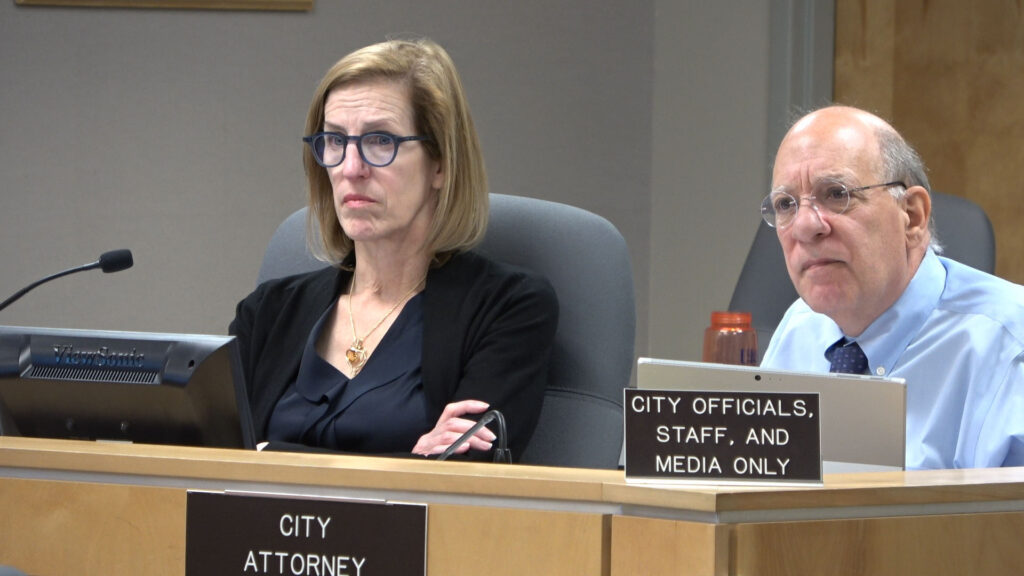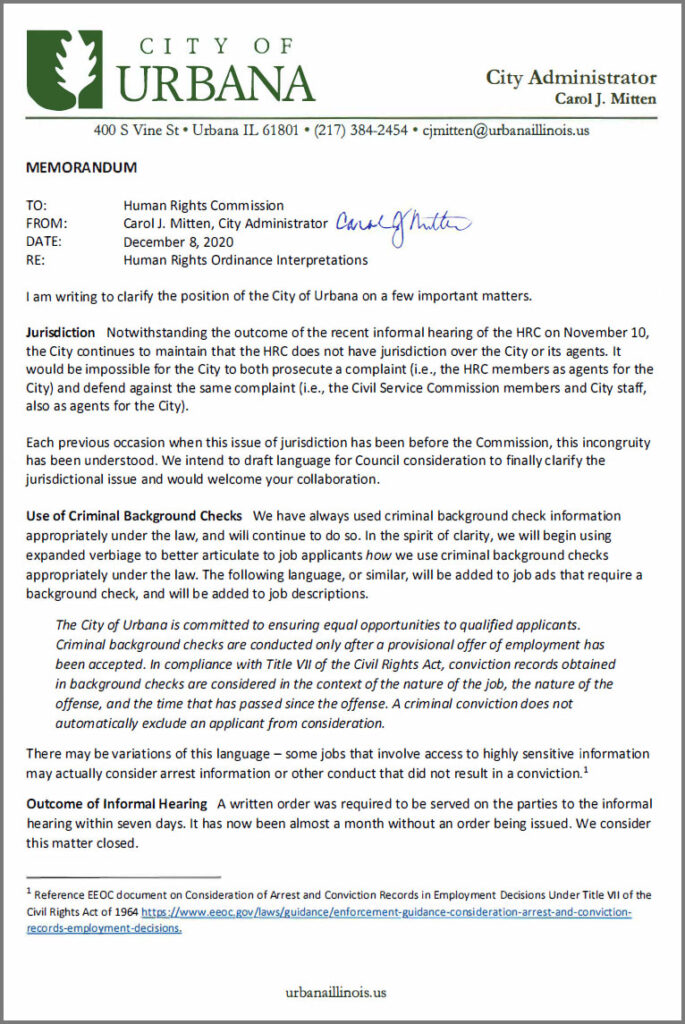
Check CU is in possession of a letter sent by the Urbana City Administrator, Carol Mitten, to the Human Relations Commission (HRC) on December 8th, 2020. The letter indicates that despite the clear outcome of an HRC appeals hearing held on November 10th, the City is refusing to accept that they need to follow the Urbana Human Rights Ordinance in regards to their own hiring practices.
At the November 10th hearing, Urbana resident Christopher Hansen argued against City Attorney James Simon (click here to view the full article and video of that hearing), who originally denied his complaint alleging discriminatory hiring practices by the Urbana Civil Service Commission (CSC). The CSC had created multiple City employment advertisements that explicitly stated the requirement that the applicant pass a criminal background check – such a statement in a job listing is forbidden by Urbana’s Human Rights Ordinance. If any private employer in Urbana had created such a job listing, they would unquestionably be in violation.
The November appeals hearing not only overturned Simon’s initial denial, but brought harsh criticism from many residents who found the City’s stance to be wrong, and Simon’s conduct ethically reprehensible. Now Carol Mitten seeks to strike down the decision of the Human Relations Commission and the overwhelming sentiment of the residents of Urbana.
This posture by the City administration is an affront to the stated values, intent, and clear language of the Human Rights Ordinance. Mitten writes in her letter:
“Notwithstanding the outcome of the recent informal hearing of the HRC on November 10, the City continues to maintain that the HRC does not have jurisdiction over the City or its agents.”
But Section 12-22 of the Urbana Human Rights Ordinance makes it crystal clear that one of the primary roles of the Human Relations Commission is to oversee the hiring practices of the City and its agents:
“The commission on human relations shall cooperate with the mayor, city council, city departments, agencies and officials in securing the furnishings of equal services to all residents…and maintaining equality of opportunity for employment and advancement in the city government.”
The implication of Mitten’s letter is not limited to the specific arguments of the November 10th hearing. Such a letter from the City administration would seem to mean that at any time that City staff dislike the outcome of any quasi-judicial hearing in Urbana, they can simply quash it with a letter to the board.
Mitten goes further and argues that the City has every right to use criminal background checks in their hiring practices, even in ways that would be unlawful by private employers in Urbana.
Mitten does provide a technicality at the end of her letter which she uses to further justify the City’s refusal to accept the outcome of the hearing:
“A written order was required to be served on the parties to the informal hearing within seven days. It has now been almost a month without an order being issued. We consider this matter closed.”
It is curious that Mitten has attempted to invoke such a technicality. Even if such an administrative lapse could nullify the appeals hearing, by the ordinance, any person who became aware of the discrimination (perhaps simply by listening to the November 10th hearing) could submit their own human rights complaints within 90 days of that discovery. If that complaint were also denied, this would force the HRC to redo essentially the same hearing.
Carol Mitten’s letter, sent to the members of the Human Relations Commission on December 8th, can be viewed here (click for pdf):


I’m just not getting the aim for expanding verbiage in the spirit of clarity when the law and ordinance require no verbiage at all. Unless your the city lawyer, its a simple none-is-best proposition.
Simon Said: Ms. Mitten, Ms. Mitten, hang on to our wool.
In the spirit of clarity’s sake, the city administrator could take a research approach for learning how to be more intentionally welcoming of would be employment applicants. Provided suitable research does not already exist, it could be worthwhile for the city to spend upwards of $20K to gain that from an organization external to the city. If city hiring practice concerns would look at employment postings from other municipalities, needed insight could be obtained at minimal expense. However, results from an actual study would be difficult to refute…even for Mr. Simon, let’s suppose.
A reasonably informed person or persons would not author a job description with the following language.
Special Requirements
• Pass a criminal background check.
An attorney representing authorship of that job description(s) would not advocate advertising such language.
And now; since the EEOC does not provide written guidance for authoring job descriptions, it stands to reason that an update to the EEOC guidance documentation is in order. That way, this one known occurrence of employment discrimination by a municipal employer is less likely to occur as often, and just maybe never again.